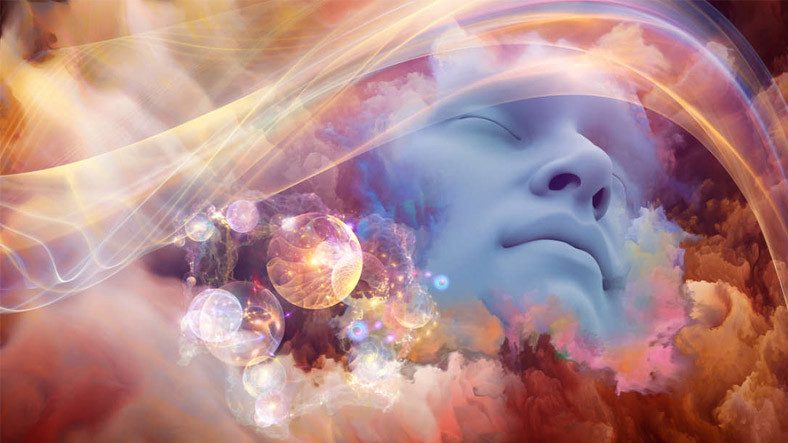Exploring the Connection Between the Brain and Dreams
The Parts of the Brain That Trigger Dreams
Dreams are a mysterious and fascinating part of the human experience. While we still don't fully understand how they work, scientists have learned a great deal about the parts of the brain that are involved in their formation.
The Frontal Lobe
The frontal lobe is responsible for a wide range of functions, including planning, decision-making, and judgment. It is also involved in the formation of dreams.
Studies have shown that the frontal lobe is more active during REM sleep, the stage of sleep when most dreams occur. This suggests that the frontal lobe plays a role in the creation of the narrative and emotional content of dreams.
The Temporal Lobe
The temporal lobe is responsible for processing sensory information, including vision, hearing, and smell. It is also involved in memory and emotion.
Studies have shown that the temporal lobe is also more active during REM sleep. This suggests that the temporal lobe plays a role in the visual and auditory imagery of dreams.
The Hippocampus
The hippocampus is a small structure in the brain that is involved in memory and learning. It is also involved in the formation of dreams.
Studies have shown that the hippocampus is more active during REM sleep in people who are dreaming about real-world events. This suggests that the hippocampus plays a role in the integration of memories into dreams.
The Amygdala
The amygdala is a small structure in the brain that is involved in emotion. It is also involved in the formation of dreams.
Studies have shown that the amygdala is more active during REM sleep in people who are dreaming about negative emotions. This suggests that the amygdala plays a role in the generation of emotional content in dreams.
How These Parts Work Together
The exact way that these parts of the brain work together to create dreams is still not fully understood. However, it is thought that they interact in a complex way to generate the vivid and often strange imagery that we experience in dreams.
One possible explanation is that the frontal lobe provides the narrative structure for dreams, while the temporal lobe provides the visual and auditory imagery. The hippocampus then integrates memories into dreams, and the amygdala adds emotional content.
Of course, this is just one possible explanation. More research is needed to fully understand how the brain creates dreams.
Conclusion
Dreams are a fascinating and complex phenomenon. While we still don't fully understand how they work, scientists have learned a great deal about the parts of the brain that are involved in their formation.
The frontal lobe, temporal lobe, hippocampus, and amygdala all play a role in the creation of dreams. These parts of the brain interact in a complex way to generate the vivid and often strange imagery that we experience in dreams.
The Effects of Dreams on Human Psychology and Emotional State
Dreams are a mysterious and fascinating part of the human experience. They can be vivid, bizarre, and even disturbing. But what are dreams, and what do they mean?
The Function of Dreams
The function of dreams is still a matter of debate. Some scientists believe that dreams are simply a way for the brain to process information and emotions. Others believe that dreams have a more symbolic meaning, representing our thoughts, feelings, and experiences.
The Effects of Dreams on Psychology
There is evidence to suggest that dreams can have a significant impact on human psychology. For example, studies have shown that people who have more vivid and emotional dreams are more likely to be creative and imaginative. They are also more likely to be open to new experiences and to be able to cope with stress.
The Effects of Dreams on Emotional State
Dreams can also have a significant impact on our emotional state. For example, people who have nightmares are more likely to experience anxiety and depression. On the other hand, people who have positive dreams are more likely to feel happy and optimistic.
The Meaning of Dreams
The meaning of dreams is a complex and subjective topic. Some people believe that dreams have a literal meaning, while others believe that they have a symbolic meaning.
There is no scientific evidence to support the idea that dreams have a literal meaning. However, there is some evidence to suggest that dreams can have a symbolic meaning. For example, studies have shown that people who are experiencing a stressful event are more likely to have dreams about that event.
Conclusion
Dreams are a complex and fascinating phenomenon. They can have a significant impact on our psychology and emotional state. While the meaning of dreams is still a matter of debate, there is evidence to suggest that they can be a valuable tool for understanding ourselves and our world.
Questions about Dreams
Here are some questions that people often ask about dreams:
- Do dreams have a meaning?
The answer to this question depends on your perspective. Some people believe that dreams have a literal meaning, while others believe that they have a symbolic meaning. There is no scientific evidence to support the idea that dreams have a literal meaning. However, there is some evidence to suggest that dreams can have a symbolic meaning.
- Why do I have nightmares?
Nightmares are vivid and disturbing dreams that can cause anxiety and fear. They are often caused by stress, anxiety, or depression. However, nightmares can also be caused by certain medications or medical conditions.
- How can I remember my dreams?
There are a few things you can do to improve your chances of remembering your dreams. First, try to go to bed and wake up at the same time each day. Second, avoid caffeine and alcohol before bed. Third, keep a dream journal next to your bed and write down your dreams as soon as you wake up.
- How can I interpret my dreams?
There is no one-size-fits-all answer to this question. The meaning of dreams is subjective and can vary depending on the individual. However, there are a few general tips that can help you interpret your dreams. First, consider the context of your dream. What were you doing? Who were you with? What was happening? Second, think about your thoughts and feelings during your dream. What were you feeling? What were you thinking? Third, compare your dream to your waking life. Are there any similarities or parallels?
What are lucid dreams?
Lucid dreams are dreams in which you are aware that you are dreaming. They can be a fun and interesting experience. There are a few techniques you can use to induce lucid dreams. One technique is to practice reality testing. This involves checking to see if you are dreaming by doing things like checking your watch or counting your fingers. Another technique is to keep a dream journal. This can help you become more aware of your dreams and the signs that you are dreaming.
Dreams are a fascinating and complex phenomenon. They can be a valuable tool for understanding ourselves and our world.
The Evolutionary Function of Dreams
Dreams are a universal human experience that have been the subject of fascination and speculation for centuries. While the exact function of dreams is still not fully understood, there is a growing body of evidence to suggest that they play an important role in our evolutionary history.
One theory is that dreams help us to process and consolidate memories. During sleep, our brains are free to focus on processing and integrating information from our waking lives. This can include both positive and negative experiences, and it is thought that dreams may help us to make sense of these experiences and to store them in our long-term memory.
Another theory is that dreams help us to prepare for future challenges. By simulating different scenarios, dreams can help us to develop coping mechanisms and to learn from our mistakes. For example, a person who has a dream about being chased by a bear may be more likely to be prepared for a real-world encounter with a bear.
Finally, some researchers believe that dreams may help us to solve problems. By allowing us to explore different possibilities, dreams can help us to come up with new solutions to problems that we are facing in our waking lives. For example, a person who is struggling with a work project may have a dream that provides them with a new insight that helps them to solve the problem.
Of course, these are just a few of the possible evolutionary functions of dreams. It is likely that dreams play a variety of roles in our lives, and it is possible that we have not yet fully understood their full significance.
Research on the evolutionary function of dreams is ongoing. As we learn more about the brain and how it works, we are likely to gain a better understanding of the purpose of dreams.
References
- Stickgold, R., & Walker, M. P. (2013). Sleep-dependent memory consolidation and reconsolidation. Neurobiology of Learning and Memory, 99, 131-143.
- Barrett, D. J. (2001). The role of dreams in shaping the human mind. Nature, 411, 626-628.
- Domhoff, G. W. (2010). The neural basis of dreaming: A cognitive and evolutionary perspective. Behavioral and Brain Sciences, 33, 771-783.
https://abapsikoloji.com/neden-ruya-goruruz-bilincaltimiz-bize-ne-sinyal-veriyor/
https://www.aksehirpostasi.com/yazarlar/ceyda-cakir/ruyalarimizin-sirlari/2047/
https://psikiyatrikadikoy.com/ruya-nedir-neden-ruya-goruyoruz/
The Role of the Unconscious Mind in Dreams
Dreams are a complex and fascinating phenomenon that have been the subject of speculation and investigation for centuries. While the exact function of dreams is still not fully understood, there is growing evidence to suggest that they play an important role in our psychological and emotional well-being.
The unconscious mind is a part of the mind that is not accessible to conscious awareness. It is thought to contain a vast store of information, including our thoughts, feelings, memories, and desires.
Dreams are thought to be a way for the unconscious mind to communicate with the conscious mind. They can be a way for us to process our emotions, work through our problems, and gain insights into ourselves.
There are a number of ways in which the unconscious mind can influence dreams. For example, the unconscious mind can:
- Provide the content of dreams. The images, characters, and events in dreams are often thought to be symbolic representations of our unconscious thoughts and feelings.
- Shape the structure of dreams. The narrative structure of dreams, as well as the emotional tone of dreams, can be influenced by the unconscious mind.
- Interpret the meaning of dreams. The meaning of dreams can be difficult to understand, but the unconscious mind may provide clues about the meaning of our dreams.
Here are some specific examples of how the unconscious mind can influence dreams:
- A person who is feeling anxious about an upcoming exam may have a dream about failing the exam.
- A person who is struggling with a relationship issue may have a dream about arguing with their partner.
- A person who is trying to make a decision may have a dream that provides them with a new perspective.
Of course, there is no one-size-fits-all interpretation of dreams. The meaning of a dream can vary depending on the individual's unique experiences and circumstances. However, by paying attention to the content, structure, and emotional tone of our dreams, we can gain valuable insights into our unconscious minds.
References
- Freud, S. (1900). The interpretation of dreams. New York: Basic Books.
- Jung, C. G. (1919). The interpretation of dreams. New York: Pantheon Books.
- Foulkes, D. (1978). The dream world. New York: Basic Books.


https://www.istockphoto.com/tr/foto%C4%9Fraflar/r%C3%BCya-g%C3%B6rmek
https://www.yurtgazetesi.com.tr/yasam/size-bir-seyler-anlatmaya-calisiyor-iste-cinsel-icerikli-ruyalar-gormenin-ned-h196352.html
https://www.yurtgazetesi.com.tr/yasam/size-bir-seyler-anlatmaya-calisiyor-iste-cinsel-icerikli-ruyalar-gormenin-ned-h196352.html
Lucid Dreams and the Ability to Control Them
Lucid dreams are dreams in which the dreamer is aware that they are dreaming. This awareness can range from a vague sense that something is not quite right to a complete and vivid understanding that the dreamer is in a dream world.
Lucid dreams are often described as being very vivid and realistic. Dreamers may be able to control their actions and the environment around them. They may also be able to communicate with other dream characters.
The Ability to Control Lucid Dreams
The ability to control lucid dreams is a skill that can be learned and developed. There are a number of techniques that can help people to have lucid dreams, including:
- Reality testing: This involves checking throughout the day to see if you are dreaming. One common reality check is to try to push your finger through your palm. In a dream, your finger will usually pass through your hand without resistance.
- Dream journaling: Keeping a journal of your dreams can help you to become more aware of your dreams and to identify patterns that may indicate that you are dreaming.
- Mnemonic induction of lucid dreams (MILD): This technique involves repeating a mantra or affirmation to yourself before bed, such as "I will have a lucid dream tonight."
How Lucid Dreams Happen
The exact mechanism that causes lucid dreams is not fully understood. However, it is thought that lucid dreams occur when the dreamer's conscious mind becomes more aware of the dream state. This can happen for a number of reasons, including:
- Increased awareness of dreams: People who are more aware of their dreams are more likely to have lucid dreams. This awareness can be increased through techniques such as reality testing and dream journaling.
- Increased levels of arousal: Lucid dreams are more likely to occur when people are in a state of heightened arousal. This arousal can be caused by factors such as stress, anxiety, or excitement.
- Certain medications: Some medications, such as antidepressants, have been shown to increase the likelihood of lucid dreams.
Benefits of Lucid Dreaming
Lucid dreams can be a fun and enriching experience. They can be used for a variety of purposes, including:
- Personal exploration: Lucid dreams can be used to explore the dreamer's own thoughts, feelings, and desires.
- Problem-solving: Lucid dreams can be used to work through problems or to come up with new ideas.
- Creativity: Lucid dreams can be a source of inspiration for creative endeavors such as writing, art, or music.
Conclusion
Lucid dreams are a fascinating and potentially beneficial phenomenon. With practice, anyone can learn to have lucid dreams.

https://onedio.com/haber/ruyanin-basrolu-olmayi-birakip-yonetmeni-olmak-15-maddede-lucid-dreaming-707540
https://www.webtekno.com/ruyalarimizi-kontrol-edebildigimiz-lucid-ruya-teknigi-bilim-tarafindan-dogrulandi-h35268.html
Dream Characters and Memories
Dreams are a complex and fascinating phenomenon that have been the subject of speculation and investigation for centuries. While the exact function of dreams is still not fully understood, there is growing evidence to suggest that they play an important role in our psychological and emotional well-being.
Dream Characters
Dream characters can be anyone or anything, from real-world people to fictional characters to animals or inanimate objects. They can be familiar or unfamiliar, friendly or hostile.
The meaning of dream characters can vary depending on the individual's unique experiences and circumstances. However, in general, dream characters are thought to represent aspects of the dreamer's own personality, thoughts, feelings, or experiences.
For example, a dream character who is similar to the dreamer in appearance or behavior may represent the dreamer's own self-image. A dream character who is different from the dreamer may represent an aspect of the dreamer's personality that they are not fully aware of or accepting.
Dream Memories
Dreams can also incorporate memories from the dreamer's waking life. These memories can be vivid and realistic, or they can be distorted or exaggerated.
The meaning of dream memories can also vary depending on the individual's unique experiences and circumstances. However, in general, dream memories are thought to represent the dreamer's thoughts, feelings, or experiences about the events or people in the memories.
For example, a dream about a past event may be a way for the dreamer to process or come to terms with that event. A dream about a person from the dreamer's past may be a way for the dreamer to connect with that person or to explore aspects of their relationship.
Connection to Reality
The connection between dream characters and memories and real life is a complex and controversial topic. Some people believe that dreams are simply a reflection of our waking thoughts and experiences, while others believe that dreams can offer us insights into our unconscious minds.
There is some evidence to support both of these views. For example, studies have shown that people who are experiencing stressful or traumatic events are more likely to have dreams about those events. This suggests that dreams can be a way for us to process and cope with difficult experiences.
However, studies have also shown that dreams can be very creative and imaginative, and that they often incorporate elements that are not based on real life. This suggests that dreams can also be a way for us to explore our own creativity and imagination.
Conclusion
The connection between dream characters and memories and real life is a fascinating and complex topic that is still being studied. While there is no one definitive answer, it is clear that dreams can play an important role in our psychological and emotional well-being.
https://www.trthaber.com/haber/bilim-teknoloji/ruyalari-da-goruntulemeyi-basardilar-182479.html


















































